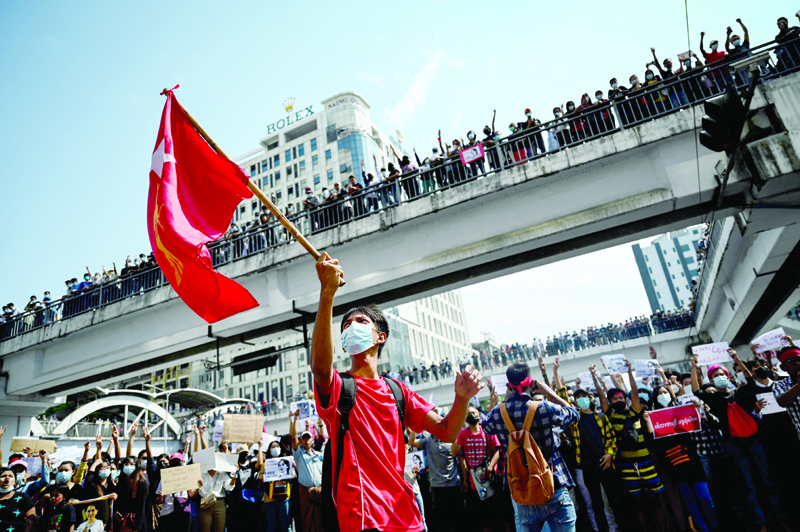 YANGON: Protesters gather to demonstrate against the February 1 military coup, in downtown in Yangon yesterday. - AFP
YANGON: Protesters gather to demonstrate against the February 1 military coup, in downtown in Yangon yesterday. - AFPYANGON: Martial law was declared in parts of Myanmar's second largest city Mandalay yesterday, after hundreds of thousands rallied across the country against the coup and the military issued a stern warning against further protests. The orders cover seven townships in Mandalay, banning people from protesting or gathering in groups of more than five, and a curfew will run from 8 pm until 4 am, the general administration department said in a statement.
A similar declaration has been made in a township in Ayeyarwaddy further south and announcements concerning other localities are expected to trickle out tonight. "This order is applied until further notice," one Mandalay township statement said. "Some people... are behaving in a worrying way that can harm the safety of public and law enforcement. Such behaviors can affect stability, safety of people, law enforcement, and peaceful existence of villages and could create riots, that's why this order bans gathering, speaking in public, protest by using vehicles, rallies," the statement said.
The military last week detained Suu Kyi and dozens of other members of her National League for Democracy party, ending a decade of civilian rule and triggering widespread international condemnation. In the face of an increasingly bold wave of defiance rippling across the country, state broadcaster MRTV warned that opposition to the military takeover was unlawful and signalled a potential crackdown.
"Action must be taken according to the law with effective steps against offences which disturb, prevent and destroy the state's stability, public safety and the rule of law," said a statement read by an announcer on the channel. Tens of thousands of people rallied over the weekend in the first major outpourings of opposition, and the movement built on Monday with bigger protests in key locations across the country, as well as the start of a nationwide strike.
In Yangon, the nation's commercial capital, massive throngs spilt onto the city's main roads, immobilizing traffic across the city and dwarfing the previous day's crowds. "Down with military dictatorship" and "release Daw Aung San Suu Kyi and arrested people", the protesters chanted, flashing the three-finger salute that has come to symbolise their movement as car horns were honked in support.
Calls for a nationwide strike had gathered momentum over the weekend, with textile workers, civil servants and railway employees walking off the job in the commercial hub. "This is a work day, but we aren't going to work even if our salary will be cut," one protester, 28-year-old garment factory worker Hnin Thazin, said. Construction worker Chit Min, 18, joined the Yangon rally saying his loyalty to Suu Kyi outweighed immediate concerns about his financial situation.
"I am jobless now for a week because of the military coup, and I am worried for my survival," he told AFP. Similarly large crowds marched in Mandalay, the second-largest city and former seat of the country's precolonial monarchy, many clutching photos of Suu Kyi and waving the red flags of her NLD party.
Police attempted to disperse thousands of people gathered on a highway in Naypyidaw, where Suu Kyi is believed to be detained. Water cannon was fired into the crowd, injuring at least two demonstrators, according to a photographer on the scene. Huge rallies were also reported across much of the country, from Muse on the Chinese border to the southern cities of Dawei and Hpa-an.
State of emergency
Myanmar's generals staged their putsch by detaining Suu Kyi, 75, and other top NLD leaders in pre-dawn raids. The generals justified the coup by claiming fraud in last November's elections, which the NLD won in a landslide. The junta proclaimed a one-year state of emergency, and promised to hold fresh elections after that, without offering any precise timeframe.
US President Joe Biden has led the global calls for the generals to relinquish power. Pope Francis yesterday called for political leaders imprisoned during Myanmar's coup to be "promptly released", in a speech to ambassadors to the Holy See. It was his second intervention on Myanmar in two days, after he used the opportunity of his Sunday recital of the Angelus prayer to express his "solidarity with the people" of the country he visited in 2017. "In these days, my thoughts turn particularly to the people of Myanmar, to whom I express my affection and closeness," the pope said yesterday, according to the official translation of his comments. - AFP









